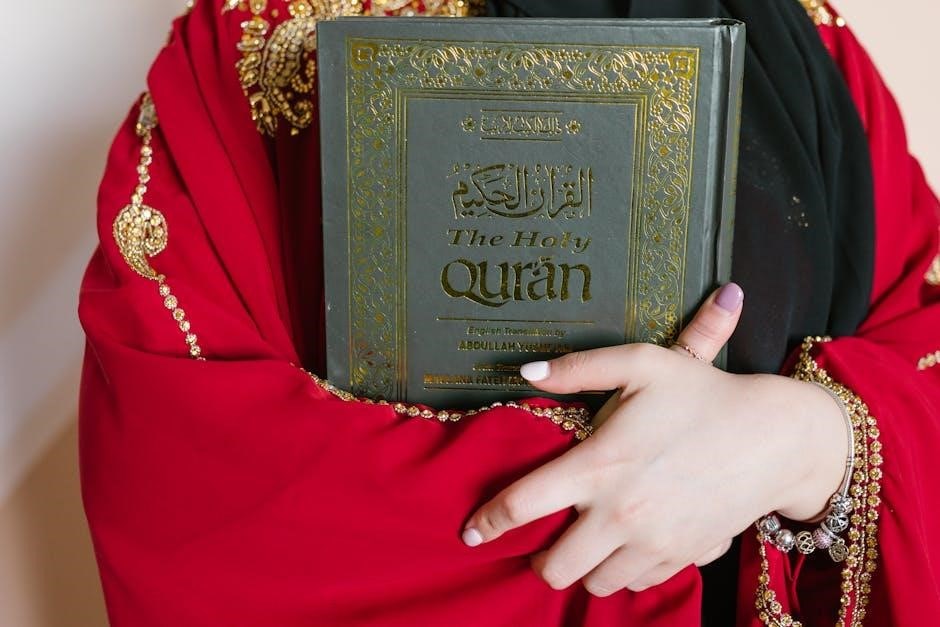The 99 Names of Allah‚ known as Asma Ul Husna‚ are divine attributes reflecting His perfection and mercy. These names‚ rooted in the Quran and Sunnah‚ guide Muslims in worship‚ supplication‚ and understanding Allah’s nature‚ fostering spiritual growth and closeness to Him.
Significance of the Names in Islam
The 99 Names of Allah hold profound significance in Islam‚ embodying His divine attributes and perfection. These names‚ derived from the Quran and Sunnah‚ serve as a guide for worship‚ supplication‚ and understanding Allah’s nature. Each name carries unique meanings and blessings‚ offering believers a deeper connection to Allah. They are central to Islamic spirituality‚ fostering reverence‚ gratitude‚ and trust in Allah’s mercy and sovereignty. Reciting and reflecting on these names strengthens faith‚ provides solace‚ and inspires righteous living. Muslims are encouraged to invoke Allah through these names in prayer‚ seeking guidance and blessings. The names remind believers of Allah’s omnipotence and benevolence‚ fostering a sense of closeness and awe. They are a timeless treasure‚ enriching the spiritual journey of every Muslim.
Overview of the Most Beautiful Names (Asma Ul Husna)
Asma Ul Husna‚ or the Most Beautiful Names‚ are 99 divine attributes of Allah‚ each describing a unique aspect of His nature. These names‚ found in the Quran and Sunnah‚ highlight Allah’s mercy‚ power‚ and wisdom; They are not only a source of inspiration but also a means to understand Allah’s characteristics‚ such as Ar-Rahman (The All-Compassionate) and Al-Hakeem (The All-Wise). Each name carries profound spiritual significance‚ offering believers a deeper connection to Allah. Muslims are encouraged to recite and reflect on these names‚ seeking guidance and blessings. The names serve as a reminder of Allah’s sovereignty and benevolence‚ fostering a sense of reverence and awe. They are a cherished part of Islamic tradition‚ enriching the faith and practice of believers worldwide.

The Meaning and Explanation of the 99 Names
The 99 Names of Allah are divine attributes from the Quran and Sunnah‚ each revealing His unique characteristics‚ from mercy to power‚ guiding believers in worship and reflection.
Allah (اللّه) ─ The Greatest Name
Allah is the most supreme and sacred name of God in Islam‚ encompassing all His attributes and perfection. It signifies His oneness and uniqueness‚ transcending human comprehension. This name is central to Islamic faith‚ representing the Creator and Sustainer of all existence. Muslims invoke “Allah” in prayer‚ reflecting their devotion and submission to His will. The name embodies His eternal nature‚ indivisible and incomparable‚ making it the foundation of the 99 Names. Understanding “Allah” deepens one’s connection to the Divine‚ fostering humility and awe. It is a name that unites all Muslims‚ symbolizing the ultimate truth and the source of all blessings.
Ar-Rahman (الرحمن) ー The All-Compassionate
Ar-Rahman‚ “The All-Compassionate‚” is one of Allah’s most profound names‚ highlighting His boundless mercy and kindness; This name emphasizes Allah’s universal compassion‚ extending to all creation‚ regardless of belief or action. It is a name of comfort‚ reassuring believers of Allah’s infinite grace and forgiveness. Ar-Rahman is often invoked in prayers and supplications‚ seeking His merciful intervention in life’s challenges. The name also underscores Allah’s role as the Nourisher and Sustainer‚ providing for all beings without distinction. Its prominence in the Quran‚ particularly in the opening verses of surahs‚ reflects its importance in Islamic worship. Ar-Rahman reminds Muslims of Allah’s gentle and loving nature‚ fostering a deeper sense of gratitude and connection to Him.
Ar-Rahim (الرحيم) ─ The All-Merciful
Ar-Rahim‚ “The All-Merciful‚” is a name that underscores Allah’s boundless mercy and forgiveness‚ particularly toward His believing servants. This name highlights Allah’s gentle and compassionate nature‚ offering hope and comfort to those who seek His pardon. Ar-Rahim is often invoked in prayers and supplications‚ as it embodies the promise of divine forgiveness and mercy. It is frequently mentioned in the Quran‚ reinforcing its significance in Islamic worship. Unlike Ar-Rahman‚ which is more universal‚ Ar-Rahim is specifically directed toward those who are deserving of mercy‚ particularly the righteous. This name inspires believers to reflect on Allah’s justice and wisdom in bestowing mercy‚ fostering a deeper sense of gratitude and reliance on His grace.

The Importance of the 99 Names in Worship
The 99 Names of Allah are integral to worship‚ enhancing prayer and supplication. They strengthen faith‚ deepen spiritual connection‚ and guide believers in expressing devotion and gratitude to Allah.
Using the Names in Prayer and Supplication
The 99 Names of Allah hold profound significance in prayer and supplication‚ serving as a means to connect deeply with Allah. Muslims are encouraged to invoke these names in their daily worship‚ as each name reflects a unique divine attribute. For instance‚ reciting Ar-Rahman (The All-Compassionate) in prayer emphasizes Allah’s mercy‚ while Al-Ghaffar (The Forgiving) seeks pardon for sins. The Prophet Muhammad (pbuh) highlighted that using these names in supplication strengthens faith and increases the likelihood of acceptance. By incorporating the Asma Ul Husna‚ believers can express gratitude‚ seek guidance‚ and draw closer to Allah’s divine presence‚ fostering a deeper sense of humility and devotion in their worship. This practice is a powerful way to enrich spiritual life and attain divine blessings.
The Role of the Names in Strengthening Faith
The 99 Names of Allah play a vital role in strengthening faith by deepening a believer’s understanding of Allah’s divine attributes. Each name‚ such as Al-Khaliq (The Creator) and Al-Hakeem (The Wise)‚ reflects Allah’s perfection and mercy‚ fostering a sense of awe and reverence. Reciting these names consistently helps believers develop a stronger spiritual connection‚ reinforcing their trust in Allah’s plan. This practice encourages mindfulness of Allah’s presence in daily life‚ cultivated through remembrance and reflection on His names. By internalizing these divine attributes‚ Muslims gain a firmer foundation for their faith‚ enabling them to navigate life’s challenges with confidence and reliance on Allah’s guidance.

Benefits of Learning the 99 Names
Learning the 99 Names of Allah enhances spiritual growth‚ deepens understanding of His divine attributes‚ and strengthens faith‚ while also offering rewards and guidance for a righteous life.
Spiritual Growth and Nearness to Allah
Learning the 99 Names of Allah fosters profound spiritual growth and deepens one’s connection with Him. Each name reveals His divine attributes‚ inspiring humility‚ gratitude‚ and reverence. By contemplating these names‚ believers gain insight into Allah’s mercy‚ justice‚ and wisdom‚ which strengthens their faith and devotion. Reciting the names with understanding enhances worship‚ creating a sense of nearness and intimacy with the Creator. This practice also cultivates self-refinement‚ as the names serve as reminders of Allah’s perfection and humanity’s purpose to worship Him. Ultimately‚ this spiritual journey aligns one’s heart with divine values‚ leading to a fulfilling and righteous life.
Understanding Divine Attributes Through the Names
The 99 Names of Allah are profound expressions of His divine attributes‚ providing insight into His nature and character. Each name highlights a unique aspect of His perfection‚ such as mercy‚ justice‚ and wisdom. By studying these names‚ believers gain a deeper understanding of Allah’s qualities‚ fostering a stronger connection with Him. The names are not merely titles but carry rich theological meanings that guide worship‚ supplication‚ and daily life. Rooted in the Quran and Sunnah‚ they serve as a blueprint for comprehending Allah’s essence‚ enabling Muslims to reflect on His greatness and majesty. This understanding strengthens faith and inspires believers to emulate His attributes in their own lives‚ aligning their actions with divine will.

How to Memorize and Recite the Names
Memorizing the 99 Names of Allah involves repetition‚ breaking them into groups‚ and using aids like flashcards or apps. Consistent practice and recitation enhance spiritual growth and understanding.
Practical Tips for Memorization
Memorizing the 99 Names of Allah can be made easier with consistent practice and structured techniques. Start by reciting the names daily‚ focusing on their meanings and pronunciation. Break the list into smaller groups‚ such as memorizing 10 names at a time‚ and gradually build up. Use flashcards or apps to reinforce memory. Listening to recitations online or in audio format can also aid retention. Repetition is key—recite the names regularly during prayers or quiet moments. Write them down in a notebook to visualize and reinforce learning. Grouping names by similar meanings or sounds can help create mental associations. Seeking guidance from teachers or joining study groups can provide additional motivation and support. Consistency and patience are essential for successful memorization.
The Best Times and Methods for Recitation
The 99 Names of Allah are most effectively recited during moments of heightened spirituality‚ such as before dawn (Tahajjud)‚ after obligatory prayers‚ and in the stillness of the night. Reciting them after Fajr and Maghrib prayers is particularly recommended; Using a structured approach‚ such as reciting a set number daily‚ helps maintain consistency. Engage your heart and mind by reflecting on the meanings of each name‚ fostering a deeper connection with Allah. Incorporate the names into your supplications‚ seeking blessings and guidance. Recitation can also be enhanced through group sessions or using audio resources. Consistency and sincerity are key to deriving the spiritual benefits of these sacred names.
The 99 Names of Allah are timeless treasures of Islamic faith‚ embodying divine attributes that guide believers in worship‚ reflection‚ and seeking closeness to the Almighty.
The Eternal Value of the 99 Names in Islam
The 99 Names of Allah hold eternal significance in Islam‚ serving as a profound expression of divine attributes and mercy. These names‚ as revealed in the Quran and Sunnah‚ are not merely titles but gateways to understanding Allah’s nature. They encapsulate His compassion‚ justice‚ and sovereignty‚ offering believers a means to connect deeply with their Creator. The eternal value lies in their ability to inspire spiritual growth‚ guide ethical living‚ and provide comfort in times of need. By reflecting on these names‚ Muslims cultivate a sense of awe‚ gratitude‚ and devotion‚ fostering a lifelong journey of faith and nearness to Allah. Their timeless wisdom continues to enlighten hearts and minds across generations‚ reinforcing the Oneness and uniqueness of Allah. Through these beautiful names‚ the Islamic faith remains a source of guidance‚ peace‚ and eternal truth.
Encouragement to Deepen Knowledge and Practice
Muslims are encouraged to deepen their knowledge and practice of the 99 Names of Allah‚ as they are a timeless source of guidance and spiritual enrichment. These names‚ with their profound meanings‚ inspire believers to cultivate a deeper connection with Allah‚ fostering humility‚ gratitude‚ and devotion. By memorizing‚ reflecting‚ and invoking these names‚ individuals can strengthen their faith‚ gain wisdom‚ and find comfort in life’s challenges. The Prophet Muhammad (peace be upon him) emphasized that enumerating these names leads to Paradise‚ highlighting their eternal value. Encouraging oneself and others to learn and practice the Asma Ul Husna nurtures a community rooted in divine love and reverence‚ ensuring a legacy of faith and righteousness for generations to come. Embrace this blessed knowledge and let it transform your heart and life.